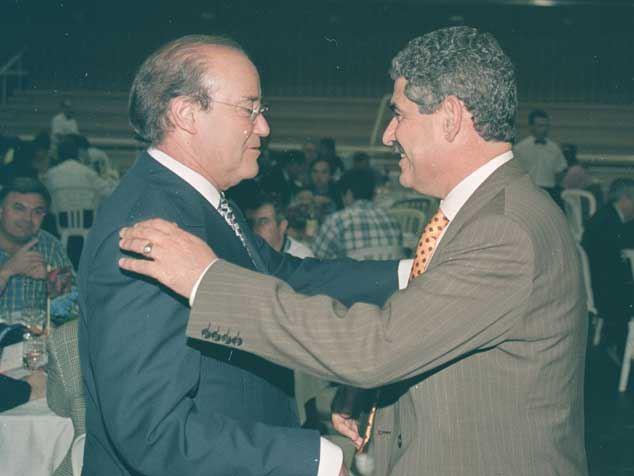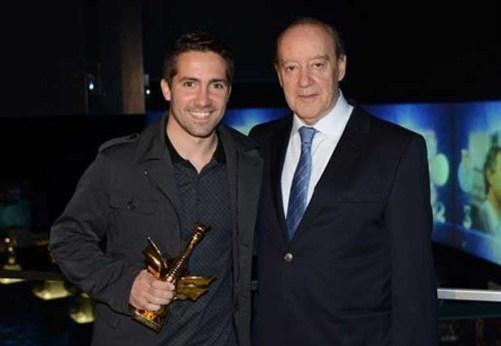The fire of the Northern dragon
Fans chant his name, his words hit first pages, his face became the symbol of a club. Pinto da Costa doesn’t score goals, doesn’t go à baliza nor at number 10, but is the major reference of Futebol Clube do Porto. For more than three decades steering the dragons, the white and blue leader adds titles… and controversies
From his tribune in Dragão stadium, in a blue tie and with his eyes on the field, Pinto da Costa watches another match of «his» Futebol Clube do Porto. Inside the four lines are more than 22 players; there is club whose mystic already mixes with its own name.
More than 30 years of presidency, more than 30 years of victories – and some setbacks -, more than 30 years of controversy. Pinto da Costa is an undeniable figure of the Portuguese football.
The dragon flies out
In the beginning of the 70’s, Futebol Clube do Porto’s hockey section won a new chief. Jorge Nuno Pinto da Costa, then at the age of 35, officialy integrated his club’s structure forever. He moved to football in 1976 and it only took him two seasons to earn the national title, that fled the dragons since 1959. It was the beginning of a new era in Futebol Clube do Porto.
With eight years, he watched his first game at Campo da Constituição, a FC Porto x Sporting da Braga. At 16, in December of 1953, he became a member of the white and blue club.
Pinto da Costa was elected presidente of Futebol Clube do Porto on April 17th of 1982, becoming the 33rd leader of the white and blue. President for more than three decades, he holds the record of the longest mandate ahead of a club in Portugal.
Idolized by fans, Pinto da Costa became the face of the portista pride. Under his leadership, the club became one of the greatest international references of the Portuguese football. His charismatic leadership revolutionized the national sport; a revolution that didn’t come unnoticed to Lenart Johansson, former UEFA president: «the map of the Portuguese football is turned upside down».
During his presidency, Futebol Clube do Porto conquered more than 50 titles in football, including two Champion’s League Cups (1987 and 2004), two UEFA Cups (2003 and 2011) and one UEFA Super Cup (1987).
Only National Championships, already won 18, five of which consecutives, a unique deed in Portugal. It is the president with the most earned titles in world football.
The A1 of the king-sport
«Lisbon can’t keep on colonizing the rest of the country. Their wish is that FC Porto lowers division». Pinto da Costa’s words illustrate the rivalry – older and deeper than football – that divides the north and the south of the country, illustrated in a century classic: FC Porto vs. Sport Lisboa e Benfica.
Pinto da Costa’s relationship with the president of the reds, Luís Filipe Vieira, actually starts with something in common: the membership card of Futebol Clube do Porto.
«Everybody knows […] that we had a friendship relation, that he would celebrate Porto’s victories», recalls the leader of the dragons.
The president of the reds retaliates: «I don’t need Benfica to live, the chief-engineer […] needs that club to live and not to be shelved».
Tense relationships – always tense -, but that reached a new peak in the 2010/2011 season, when FC Porto earned the national championship at the Luz stadium. «It was different because I’ve never celebrated a title in the dark», declared Pinto da Costa.
Luís Filipe Vieira answered accusing FC Porto of having a history made of «corruption and collusion». Pinto da Costa provoked again, manifesting the will of keeping Luz stadium as the dragons’ ballroom.
Tame the lion, gentle the panther
On the other side of Segunda Circular, Sporting Clube de Portugal completes the trilogy of the great in Portuguese football and is other of the main adversaries of FC Porto, in and outside the filed.
The arrival of Bruno de Carvalho to the presidency of the lions, in 2013, brought new contours to a relationship already unfriendly.
João Moutinho, a player trainned in Sporting and transferred to Futebol Clube do Porto, was in the epicenter of the controversy. The sale of the player to Mónaco for 25 million euro motivated the exchange of critics between the two presidents.
«To consider that […] we sold him for more than double, the “rotten apple” transformed into a very wanted apple», considered Pinto da Costa.
Bruno de Carvalho stated that the white and blue leader was losing capacities. «Sporting doesn’t know much about fruit, […] but there is one thing we are sure of: we are not bananas».
Up north, Pinto da Costa also collects enmities, starring a centenary rivalry with Boavista FC. «There is people that is a mais in football and should fulfill what they do and should really abandon it», striked the white and blue president. João Loureira, leader of Boavista, didn’t settle here. «I think the person in Portugal that speaks the most about Boavista, must be mister Pinto da Costa».
The dragon and quinas
Pinto da Costa’s relationship with the National Team isn’t peaceful either. Things went wrong when the then national coach Luiz Felipe Scolari didn’t call the FC Porto goalkeeper, Víto Baía, for Euro 2004, a much contested decision.
 Years after, the Brazilian technician revealed that Pinto da Costa had a saying about the choices for the National Team. «Everybody knows he has great influence. […] He can have an opinion about one of another player», he explained.
Years after, the Brazilian technician revealed that Pinto da Costa had a saying about the choices for the National Team. «Everybody knows he has great influence. […] He can have an opinion about one of another player», he explained.
The controversy remained when Paulo Bento occupied the position of national coach. Pinto da Costa commented the physical condition of the players of Futebol Clube do Porto used in the team.
«Who makes the National Team is me and no one else. […] Whomever doesn’t want to understand, won’t, and will continue to say meaningless things», answered Paulo Bento, in a press conference.
The Federation also didn’t escape Pinto da Costa’s sharpness. The president accused the organism of causing adversities in the clubs: «The Federation is after money […] and then takes our players in a crucial time».
Bards, accusations, indirect statements and quarreling; even out of the four lines, Pinto da Costa has his tactics well studied.
Toilets, rivers… and whistles
An iconic leadership, a charismatic presence and a peculiar communication. To speak of Portuguese football is, mandatorily, to speak of Pinto da Costa. It was already like this in 1995. The white and blue leader was involved in one of the most polemic cases of attachment orders to football clubs due to tax debts. An attachment that involved, among other assets… the toilet of the referee’s cabin.
«If you tell me: Professor Cavaco Silva and his Government will rule for four more years, I say to you: it is a catastrophe», attacked the blue and white leader. In a press conference full of fans, the dragon spit fire: «What is wanted to hit is, maybe, one of the last bastions of the north of the country».
After the victory of Futebol Clube do Porto in the Champion’s League, in 1987, the then Prime-Minister would have stated that «the Country was being managed over the image of FC Porto».
The «centralism» of the Portuguese football is, in fact, a recurrent theme in Pinto da Costa’s attacks. «It is in the local power where we have to resist to a centralism ever more absurd», accused the white and blue leader.
But is own relationship with the local power is everything but peaceful. Rui Rio, at the time Mayor of Oporto’s City Hall, wasn’t invited for the inauguration of the Dragão Stadium. «The only river [Rio] that we respect is the Douro River, the others can’t flood us nor can even wet our feet», claimed the leader of the white and blue.
Pinto da Costa inspired one of the most popular characters of the humoristic show «Contra Informação», aired by RTP1.
Other of Pinto da Costa’s preferential targets is, of course, the arbitrage: «Now referees can put laws in their pocket and don’t apply them», claimed the president of FC Porto.
The arbitrage left, in fact, a stain in his presidency. Pinto da Costa has been charged in the law suit Apito Dourado, an investigation process about the corruption of referees and managers of Portuguese football. He ended up absolved.
Justice may have archived the process, but the media system didn’t forget it. The cause gained novel contours with the involvement of Carolina Salgado, Pinto da Costa ex-girlfriend. Violence, bribery, sex, all the ingredients that made the plot a first page and a newscast opening story. The work «Eu, Carolina», became a sales hit and was turned into a movie.
The northern accent, the expressive language, the suis generis expressions and the soundbite at the tip of the tongue make the white and blue leader of the main figures of sports in Portugal. A dragon whose claws left their mark in the national media system.






